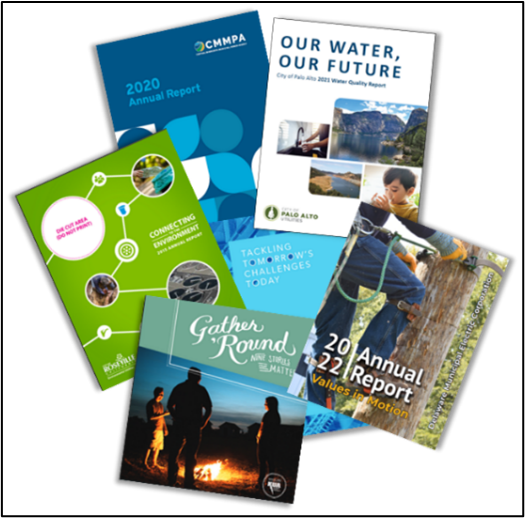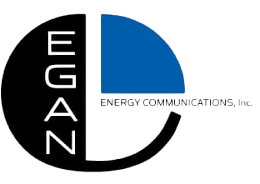 Who are you writing for?
Who are you writing for?
Successful writers start by thinking about their audience. Stephen King doesn’t write for the same audience that reads Jodi Picoult or Philippa Gregory. That’s not a dis on any of those oft-published, fabulously successful fiction writers. But it is a restatement of the First Commandment of Writing: Know thy audience!
In my experience, that commandment is too rarely obeyed. I can’t tell you how many times I have been on a content kick-off call with many intelligent people who had no clear answer when I asked about the audience they wanted to reach with a specific piece of written content. Eager to jump into the specifics of a program, technology, initiative, or trend, they didn’t think enough about their intended audience.
Having written a number of annual reports (pictured above) for public power utilities, and blogging occasionally about that work, recently I was reminded again about the importance of First Commandment of Writing: Know Thy Audience!
Why Your Audience Matters
Defining your audience is important because it determines what information will be relevant for the piece. Engineers and finance professionals won’t read a piece about environment, social, and governance (ESG) if the predominant message is that it’s trendy and everyone is doing it. They are looking for quantitative metrics like return on investment (ROI) or stock price appreciation. Similarly, using those metrics in a piece seeking to inform your residential customers about your ESG initiatives will fall flat.
When this is made explicit, most professionals get it. All audiences may be equally valid, but for each written piece, you need to pick one horse and ride it.
Profit-seeking utilities are laser focused on the audience of their annual reports: investors. And the key metric is earnings per share. Anything that doesn’t speak to investors, or talk about how the company in question is making investors wealthier, ends up on the cutting room floor.
Communications Tip of the Month: When writing anything, begin with the end in mind. Who is the intended audience for this piece? Are you featuring their perspectives in the piece? Zeroing in on your audience is the fastest way to separate critical information from interesting but peripheral information.
Some profit-seeking utilities have broadened the focus of their annual reports to include non-shareholders, such as employees, bankers, regulators, credit rating agencies, suppliers, the business community, and community leaders, recognizing all those stakeholder groups have some form of veto power over what the CEO wants to do.
Exhibit A: DEMEC Annual Report
I recently wrote the copy for the 2022 annual report for the Delaware Municipal Electric Corporation (DEMEC), a public power organization, where I had the pleasure of working alongside Heather Contant, the group’s director of government and community relations. We started by discussing the report’s intended audiences: As a public power joint-action agency with eight electric distribution utility members, the main audiences for DEMEC’s annual report were its members, community and government officials, and the financial community.

The year before, DEMEC had adopted five core values to guide the organization. These values made explicit what had long been implicit: organizational culture, member focus, operational excellence, sustainability, and education.
With an eye on their audiences, Heather and I decided to showcase how the organization was turning those values into action. We decided to interview the CEO and eight board members about the specific ways the organization was putting its values into action.
Talking to stakeholders is an oft-overlooked source of insight. They have a unique perspective, different from corporate leadership. Also, it’s the best way to get other stakeholders — the intended audience — to read the report: the stakeholders quoted, for the most part, are the type of readers you are trying to reach, and they are eager to see what those who are in the same boats have to say.

So, for example, to fulfill a core value of training, DEMEC provided 118% more hours of professional development to its members and their staffs than it had in 2021. Several members were quite complimentary about DEMEC’s dramatic expansion of training.
On the core value of operational excellence, we interviewed DEMEC Board Member Scott Blomquist, who also is the general manager of the Municipal Services Commission (MSC) of the City of New Castle. He had first-hand experience with operational excellence because for years, he made his living climbing utility poles as a lineworker for the MSC. For him, operational excellence means having the right equipment and tools at the right time so he could do the job right.
“I’m glad that DEMEC adopted operational excellence as a core value. It’s one of those things that was mostly expected, but rarely stated explicitly. Now, all of us are better off knowing operational excellence is part of the organization’s DNA.”
It’s important to ask those you interview how they define a particular topic or challenge and how they are addressing it. For example, different DEMEC members are pursuing different sustainability initiatives. Available land is at a premium in Delaware, so buying several hundred acres of land and building a large solar farm is not practical.
Tom Coleman, City Manager for the City of Newark and DEMEC Board Vice Chair, reflected on specific support his city received from DEMEC on sustainability, then added:
“DEMEC has always been a good partner on sustainability. If we have a special need, they help us out. It’s great that the board adopted sustainability as a core value because different members have different needs when it comes to sustainability, but no matter how they pursue it, they know they can count on DEMEC.”
Reaching Your Readers’ Brains by Touching Their Hearts
Remember this: the best way to make a point resonate with stakeholders is to make it using stakeholder perspectives. Stories that touch the hearts of stakeholders are instrumental in humanizing your utility with that audience.
Heather was delighted with the finished product. She graciously said:
“We recently updated our strategic plan and wanted an annual report that would reflect our defined mission and values. John did an amazing job capturing the personality of our organization and highlighting our values in action from our stakeholders’ perspectives. His years of experience in public power and writing annual reports brought a much-needed revitalization to our content and saved me a bunch of time from having to explain the electric industry and public power business model.”
If we follow the recommendation from Stephen R. Covey, to begin with the end in mind, we will find greater success and less wasted time, effort, and money.
________________________________________________________________________

